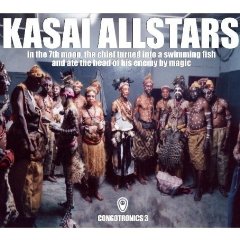Irrespective of the mind-bendingly evocative title and the fluid beauty of the sounds within its shamans-in-a-warehouse sleeve, we should be grateful to be able to get our hands on this package at all. The Allstars hail from Kinshasa in the Democratic Republic of Congo but include musicians from five different backgrounds (all with their own languages and musical traditions). DR Congo is still decimated and suffering hugely from the aftermath of a succession of wars – a now allegedly stable government still involved in repression, corruption and an enormous suffocation of free speech. All this still carries on under the averted gaze of the rest of the world. The Allstars themselves were victim to this regime only recently, having their European tour cancelled at the last minute due to visa ‘problems’ which grounded them in their home country unable to leave. Coupled with an initial reluctance a few years back to release the Congotronics material due to it being too extreme (a truly baffling notion) and Konono No. 1 receiving a relatively recent BBC newcomers award (they’ve only been playing together for 30 years), the arrival of this CD is welcome news indeed.
As the third volume of the Congotronics series, Kasai Allstars front a slightly different sound to Konono No. 1, which could possibly be described as being slightly more rockist (which actaully is about as accurate as comparing Bon Jovi to Can but never mind).Their DIY aesthetic captured so beautifully by Vincent Kenis is an amalgamation of six vocalists, electric bass, xylophones, marimbas, electric guitars, huge amounts of different percussive items and the entirely distinctive distorted thumb-pianos, the first appearance of which is always a WHAT THE FUCK? moment.
Despite the distressing political, financial and social climate in their homeland, the album’s roots are pre-European and drawn from ritual music accompanying erotic dances and pagan trance cerimonies. Indeed, trance is the definitive word here. ‘Kafuulu Banu’ is a joyful noise, every player laying down a hard groove that moves in and out of the mix. Every space becomes filled to overflowing- an earths core funky bassline allowing sharp echoplexed and effects-driven rhythm and lead guitars to fly over the heads of vocalists in a call and response dialogue. The relentlessness of the motion is heart-stopping, although the pace is never furious- you can imagine them playing for hours. In sharp contrast this is followed by ‘Beyond the 7th Moon’ which is starker, almost entirely percussive and much more abstract, following a stranger rhythmical logic. Despite its eight minute length ‘Mpombo Yetu’ trips on a shiny guitar line, initially feeling much more song-like until the pace kicks in and everybody gets on the good foot again. ‘Tshitua Fuila Mbuloba’ is the starkest of all, acapella vocals and only the most minor of percussive click.
So, another superb entry in an absolutely essential series. Let’s hope that these unique artists can find their way round some atrocious political bullshit and bring their world to European stages sometime in the near future. That will be one hell of a party.


